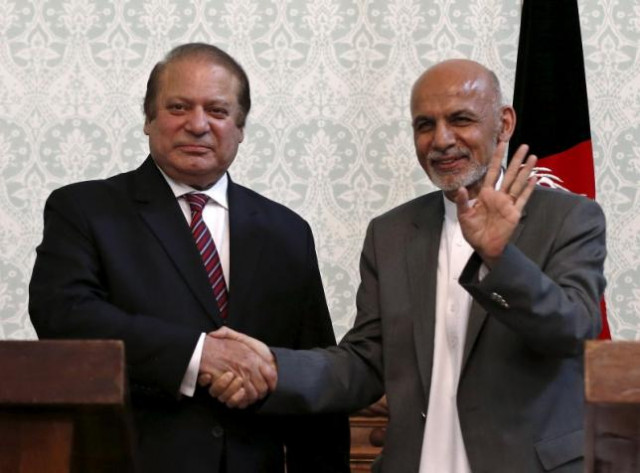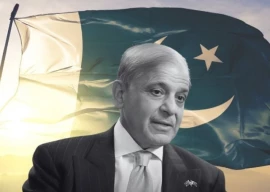
When the Afghan government held a conference in Kabul to pay tribute to Khan Lala, three politicians decided to fly in from Pakistan and attend the conference. During their visit, Asfandyar Wali Khan, Mahmood Khan Achakzai and Aftab Ahmad Khan Sherpao took on the role of conciliators of the peace process between Islamabad and Kabul.
The politicians succeeded in convincing Prime Minister Nawaz Sharif and Afghan President Dr Ashraf Ghani to resume talks. The development comes after a hiatus of over three months during which both neighbouring countries levelled allegations against each other. This appears to be a good omen for people affected by militancy in both countries.
After successful mediation, Nawaz and Ghani met each other in three different places. Although these meetings were informal, both leaders discussed matters of mutual interest, including the growing distrust between Afghanistan and Pakistan
Stumbling blocks
Conventional wisdom would have us believe that terrorism is an issue confronting both countries and a unanimous response is needed to resolve this menace. However, rulers and policy-makers from both nations do not trust each other.
Child Rights Movement President Zar Ali Khan believes only politicians can help resolve tensions and misunderstanding between Pakistan and Afghanistan.
“Certain hardliners within civil and military establishments, religious circles and political parties are responsible for weakening relations between Kabul and Islamabad,” he said.
Zar added peace-loving and democratic people are realising the importance of putting an end to violence. They are now engaging in dialogue.
However, Brigadier (retd) Mahmood Shah, who had served as Fata law and order secretary, believes countless problems exist within Afghanistan. He said a group within the Afghan government opposed Ghani’s recent visit to Pakistan and chief of Afghan intelligence also resigned from his office in protest.

Shah also highlighted the leadership crises within Afghan Taliban as a potential stumbling block.
“Unless internal rifts within Afghan ranks are resolved, talks between the two neighbouring countries cannot yield positive outcomes,” he said.
According to Shah, Pakistan is sincere in its pledges of brokering dialogues between Afghan government and Taliban.
Significance of dialogues
After visiting India, Pakistan Tehreek-e-Insaf chief Imran Khan stressed on dialogues between the two countries. In 1965, it was late prime minister Zulfikar Ali Bhutto who ensured the end of war through the Tashkent Declaration.
At this stage, a similar move needs to be adopted. Politicians, irrespective of their stance and position, always insist on political means for handling of issues and dialogues are the best way to go about them.
Now that long-awaited historical Turkmenistan, Afghanistan, Pakistan and India (TAPI) gas pipeline project has been signed, peace between Pakistan and Afghanistan has become even more crucial. All signatories need to think of ways to maintain peace and stability in the region. Since US-led allies failed to do so with guns and bullets, dialogues are the new norm supported by the European community, China and the US.
Recap
Hostile relations between Afghanistan and Pakistan had emerged ever since the partition of the Subcontinent in 1947. However, animosity reached its climax when successors of Mullah Umar announced termination of dialogues with the Ghani government. Afghan militants also revolted in Kunduz and engaged in unprecedented violence in Khost, Nangarhar and several others regions in Afghanistan – the blame for which fell on Islamabad directly. Both countries, without any formal declaration, terminated contact with each other and also imposed restrictions against diplomatic missioners and visitors.
A deadlock was reached when rulers and policy-makers exchanged harsh words through print and electronic media. No international allies helped ameliorate tension.
Published in The Express Tribune, December 14th, 2015.












COMMENTS
Comments are moderated and generally will be posted if they are on-topic and not abusive.
For more information, please see our Comments FAQ